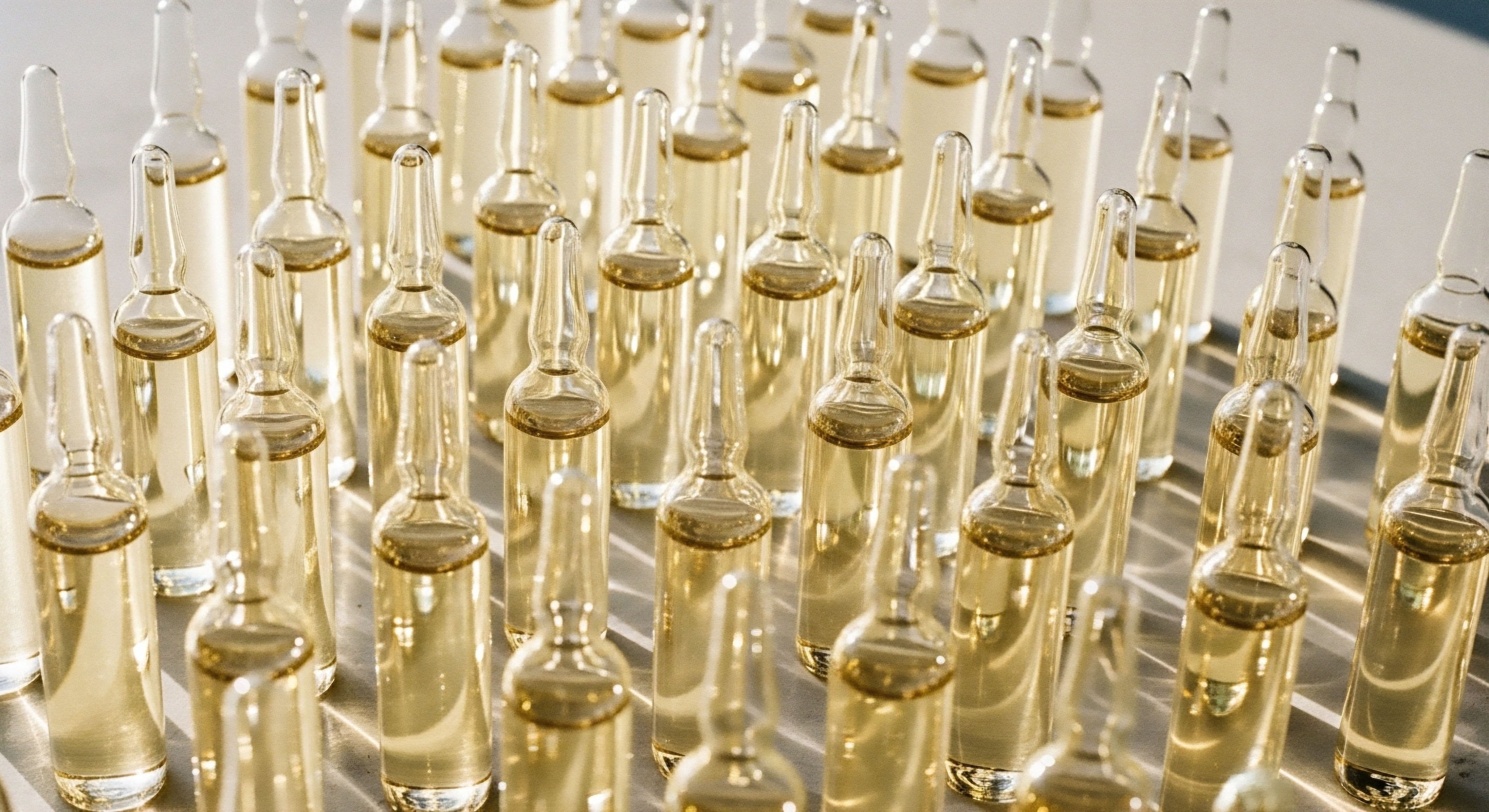

Fundamentals
The sensation is a familiar one for many. It arrives as a subtle yet persistent fog, a sense of cognitive friction where thoughts once flowed freely. You might find yourself standing in a room, unable to recall why you entered, or grasping for a word that has always been readily available.
This experience of diminished mental clarity is a deeply personal and often unsettling phenomenon. It is the subjective, lived reality for countless individuals, a feeling that your own mind, once a reliable tool, has become somehow less sharp. Your internal world feels clouded, and the confidence you once had in your ability to think, focus, and remember may begin to wane. This is a valid and concrete experience, one that deserves a clear, biological explanation.
This cognitive haze is frequently a direct manifestation of shifts within your endocrine system, the body’s intricate and elegant internal messaging service. This system relies on hormones, powerful chemical messengers that travel through the bloodstream to regulate nearly every bodily process, from metabolism and sleep cycles to mood and, critically, brain function.
When the production and balance of these hormones change, as they inevitably do during life stages like perimenopause for women or andropause for men, the signals that govern mental acuity can become disrupted. The brain, an organ exquisitely sensitive to these hormonal cues, begins to function differently. The feeling of “brain fog” is a physiological signal that this complex communication network is undergoing a significant recalibration.
The brain’s cognitive performance is directly linked to the stability and availability of key sex hormones, which act as powerful neuromodulators.
Understanding the primary hormonal actors involved is the first step toward demystifying these cognitive changes. While dozens of hormones play a role, three are particularly central to mental clarity ∞ Estradiol, Progesterone, and Testosterone. Each performs a unique and vital function within the central nervous system.

The Architects of Your Mental World
Thinking of these hormones as architects and maintenance crews for your brain helps to clarify their roles. They are responsible for building, protecting, and ensuring the smooth operation of the neural structures that support cognition. When their levels fluctuate, the integrity of this cognitive architecture can be affected.

Estradiol the Master Regulator
Estradiol, the most potent form of estrogen, is a cornerstone of cognitive health, particularly in the female brain. It acts as a powerful neuroprotective agent, shielding neurons from damage and supporting their growth and connectivity. Estradiol also plays a direct role in the synthesis and regulation of key neurotransmitters, including serotonin and dopamine, which are fundamental to mood, motivation, and focus.
During perimenopause, the dramatic fluctuations and eventual decline in estradiol levels remove a critical layer of this protection and regulation. The result can be a noticeable decrease in processing speed and verbal memory, contributing significantly to the sensation of brain fog.

Progesterone the Calming Agent
Progesterone is often thought of primarily for its role in the menstrual cycle and pregnancy. Its influence on the brain is equally profound. A metabolite of progesterone, called allopregnanolone, is a powerful modulator of the GABA system, the brain’s primary inhibitory or “calming” network.
Healthy allopregnanolone levels promote a sense of calm, reduce anxiety, and are essential for restorative sleep. As progesterone levels become erratic and decline during the menopausal transition, the brain loses a key source of this calming influence. This can lead to increased anxiety, irritability, and disrupted sleep, all of which directly impair daytime mental clarity and cognitive function.

Testosterone the Driver of Focus and Vigor
In both men and women, testosterone is a critical driver of mental energy, motivation, and cognitive endurance. It is associated with functions like spatial reasoning and verbal fluency. In men, the gradual decline of testosterone during andropause can lead to a noticeable drop in mental sharpness, motivation, and overall vitality.
In women, testosterone is produced in smaller amounts, yet it remains essential for libido, mood, and cognitive function. When levels drop, often concurrently with estrogen and progesterone, it can compound the feelings of mental fatigue and fogginess. Understanding the distinct yet interconnected roles of these three hormones provides a foundational map for navigating the biological reasons behind changes in your daily mental experience.


Intermediate
To truly grasp how hormonal shifts translate into the subjective experience of brain fog, we must move beyond the architects and examine the intricate communication systems they oversee. The brain’s function relies on the precise firing of neurons, a process governed by chemical messengers called neurotransmitters.
Hormones like estradiol, progesterone, and testosterone are not merely passive influences; they are active directors of this neural symphony, modulating the synthesis, release, and reception of the very chemicals that allow you to think, feel, and remember.
The decline or fluctuation of these hormones disrupts this delicate neurochemical balance. It is akin to a finely tuned orchestra losing its conductor. The musicians are still present, but their timing becomes erratic, and the harmony dissipates. This is the neurobiological reality of hormonal brain fog. It is a direct consequence of altered brain chemistry, a tangible shift in the way your neurons communicate with one another.

How Do Specific Hormones Modulate Brain Chemistry?
The influence of sex hormones on brain function is specific and measurable. Each hormone interacts with distinct neurotransmitter pathways, and understanding these interactions reveals why a decline in one hormone can produce such different cognitive and emotional symptoms than a decline in another.

Estradiol’s Command over Serotonin and Dopamine
Estradiol’s impact on mental clarity is deeply rooted in its relationship with serotonin and dopamine. Estradiol promotes the synthesis of serotonin, the neurotransmitter most associated with mood stability, well-being, and cognitive flexibility. It also enhances the function of serotonin receptors, making the brain more responsive to the serotonin that is available.
When estradiol levels fall during perimenopause, this supportive influence wanes, which can lead to lower effective serotonin activity. This contributes not only to mood changes but also to a decline in the ability to pivot between tasks and maintain a positive, focused outlook.
Simultaneously, estradiol modulates the dopamine system, which governs motivation, reward, and executive functions like planning and concentration. By supporting dopamine pathways, estradiol helps maintain mental drive and the ability to engage with complex tasks. Its decline can therefore manifest as apathy, procrastination, and a distinct feeling of mental fatigue, where even simple cognitive efforts feel draining.

The Progesterone-GABA Connection
The calming influence of progesterone is primarily mediated by its metabolite, allopregnanolone. This neurosteroid is a potent positive allosteric modulator of GABA-A receptors. In practical terms, this means it makes the brain’s primary “braking” system more efficient.
It enhances the calming effect of GABA, which helps to filter out mental noise, reduce anxiety, and facilitate the transition into deep, restorative sleep. The erratic progesterone production in perimenopause leads to unpredictable allopregnanolone levels. This can feel like the brain’s volume control is broken, leading to heightened anxiety, racing thoughts, and, most critically, poor sleep quality.
Since sleep is essential for memory consolidation and clearing metabolic waste from the brain, its disruption is a major contributor to next-day brain fog.
The disruption of sleep architecture due to progesterone decline is a primary driver of daytime cognitive impairment during the menopausal transition.
Restoring hormonal balance through carefully managed clinical protocols can directly address these neurochemical deficits. For women in perimenopause or menopause, hormone replacement therapy (HRT) using bioidentical estradiol and progesterone can replenish the brain’s supply of these critical modulators. Low-dose testosterone may also be considered to restore mental energy and focus.
For men experiencing andropause, Testosterone Replacement Therapy (TRT) can improve cognitive parameters, but its success often depends on managing its conversion to estradiol via the aromatase enzyme. This is why protocols for men frequently include an aromatase inhibitor like Anastrozole, to maintain an optimal balance between testosterone and estradiol for brain health.
| Hormone | Primary Cognitive Impact in Deficiency | Primary Emotional Impact in Deficiency |
|---|---|---|
| Estradiol (Women) | Verbal memory lapses, slower processing speed, difficulty with multitasking. | Mood swings, irritability, increased susceptibility to depressive feelings. |
| Progesterone (Women) | Poor memory consolidation due to sleep disruption, racing thoughts. | Anxiety, restlessness, feeling “wired but tired.” |
| Testosterone (Men & Women) | Reduced spatial reasoning, decreased verbal fluency, mental fatigue, poor focus. | Low motivation, apathy, diminished sense of well-being and confidence. |
- Hormonal Optimization Protocols ∞ For women, this typically involves transdermal estradiol combined with oral or transdermal progesterone. Weekly subcutaneous injections of low-dose Testosterone Cypionate (e.g. 10-20 units) may be added to address deficits in energy and libido.
- Male Andropause Management ∞ The standard protocol often involves weekly intramuscular injections of Testosterone Cypionate (e.g. 200mg/ml). This is frequently paired with Gonadorelin to maintain testicular function and Anastrozole to control the aromatization of testosterone into estrogen, ensuring a balanced hormonal profile for optimal cognitive and physical health.
- Fertility and Post-TRT Protocols ∞ For men seeking to restore natural production after discontinuing TRT or to enhance fertility, protocols may include agents like Gonadorelin, Clomid, or Tamoxifen to stimulate the body’s own hormonal signaling pathways.


Academic
An academic exploration of hormonal influence on mental clarity requires a systems-biology perspective. The brain does not exist in isolation; it is in constant dialogue with the body’s other major regulatory networks. The cognitive symptoms that arise from hormonal fluctuations are the emergent properties of a complex interplay between the endocrine system, the central nervous system, and the immune system.
Specifically, the integrity of the Hypothalamic-Pituitary-Gonadal (HPG) axis is inextricably linked to the function of the Hypothalamic-Pituitary-Adrenal (HPA) axis, the body’s primary stress response system. Dysfunction in one axis invariably perturbs the other, creating a cascade that culminates in neuroinflammation and metabolic dysregulation at the cellular level.
The decline in gonadal hormones, particularly estradiol, removes a powerful anti-inflammatory and neuroprotective shield from the brain. Estradiol helps maintain the integrity of the blood-brain barrier, regulates microglial activation (the brain’s resident immune cells), and supports efficient mitochondrial function, the powerhouses of the neuron.
As estradiol levels wane, the brain becomes more vulnerable to inflammatory insults and energetic deficits. This creates a state of heightened neuroinflammation, which is now understood to be a core mechanism underlying not only mood disorders but also the cognitive decline experienced as “brain fog.” This low-grade, chronic inflammation impairs synaptic plasticity, slows neuronal communication, and contributes to the oxidative stress that can damage neural structures over time.

What Is the Role of Neuroinflammation in Hormonal Cognitive Decline?
The onset of perimenopause or andropause can be viewed as a critical window of vulnerability where the brain’s homeostatic mechanisms are challenged. The loss of hormonal support can initiate a self-perpetuating cycle. For instance, declining progesterone and subsequent sleep disruption elevate cortisol levels via HPA axis activation.
Chronically elevated cortisol is itself pro-inflammatory and neurotoxic, particularly to the hippocampus, a brain region essential for memory formation. This stress-induced inflammation further disrupts neurotransmitter balance, compounding the initial effects of hormonal decline. Therefore, the feeling of mental fog is a manifestation of a brain under silent inflammatory and metabolic siege.
The cognitive deficits associated with hormonal shifts are rooted in a combination of neurotransmitter dysregulation, heightened neuroinflammation, and impaired neuronal energy metabolism.
This systems-level understanding opens the door to more sophisticated therapeutic interventions that go beyond simple hormone replacement. Advanced protocols may target the downstream consequences of hormonal decline, such as impaired cellular repair and inefficient signaling. This is where peptide therapies, particularly those that modulate the growth hormone (GH) axis, become highly relevant. Growth hormone secretagogues, such as the combination of CJC-1295 and Ipamorelin, offer a compelling approach to restoring systemic and cognitive vitality.
CJC-1295 is a long-acting Growth Hormone-Releasing Hormone (GHRH) analogue, while Ipamorelin is a selective ghrelin receptor agonist (a Growth Hormone Secretagogue). Used in combination, they stimulate the pituitary to release GH in a manner that mimics the body’s natural, youthful pulsatility.
This restoration of GH pulses has profound effects that address the core issues of hormonal cognitive decline. Improved GH signaling is strongly linked to enhanced sleep quality, particularly an increase in deep-wave sleep. This stage of sleep is critical for memory consolidation, synaptic pruning, and the glymphatic clearance of metabolic debris from the brain.
By improving sleep architecture, these peptides directly combat a primary cause of brain fog. Furthermore, GH and its downstream mediator, IGF-1, have powerful neurotrophic and anti-inflammatory effects, supporting neuronal health and resilience.
| Peptide Therapy | Mechanism of Action | Primary Benefits for Mental Clarity |
|---|---|---|
| Ipamorelin / CJC-1295 | GHRH analogue and selective GH secretagogue combination. Stimulates natural, pulsatile GH release. | Improves deep sleep quality, enhances memory consolidation, reduces neuroinflammation, increases daytime energy and focus. |
| Sermorelin | GHRH analogue that stimulates the pituitary gland to produce more of its own growth hormone. | Enhances sleep quality, supports cognitive function, and improves overall vitality. |
| Tesamorelin | A potent GHRH analogue specifically studied for its effects on reducing visceral adipose tissue. | Improves metabolic health, which indirectly supports cognitive function by reducing systemic inflammation. |
| PT-141 (Bremelanotide) | Melanocortin receptor agonist, primarily used for sexual health. | Can enhance libido and sexual function, which has a positive secondary impact on mood, connection, and overall well-being. |
- Comprehensive Baseline Assessment ∞ The process begins with a thorough evaluation of symptoms, personal and family medical history, and lifestyle factors. This is followed by extensive laboratory testing, including a full hormone panel (total and free testosterone, estradiol, progesterone, DHEA-S, SHBG), metabolic markers (fasting insulin, glucose, HbA1c), inflammatory markers (hs-CRP), and a complete blood count.
- Analysis and Protocol Design ∞ The clinical team analyzes the lab results in the context of the individual’s symptoms and goals. A personalized protocol is designed, which may include hormone optimization (e.g. TRT or HRT), peptide therapy (e.g. CJC-1295/Ipamorelin), and targeted nutritional and lifestyle guidance.
- Implementation and Titration ∞ The patient is educated on the protocol, including administration techniques for subcutaneous injections. The initial dosages are conservative, and the therapy is carefully monitored. Follow-up consultations and lab work are scheduled to allow for precise titration of dosages to achieve optimal levels and symptomatic relief while ensuring safety.
- Ongoing Monitoring and Adjustment ∞ Hormonal health is a dynamic process. The protocol is viewed as a long-term partnership, with regular check-ins and lab monitoring to adjust therapies as the individual’s physiology and needs evolve over time. This ensures sustained benefits for cognitive function, metabolic health, and overall vitality.

References
- Janelidze, S. et al. “Changes in the brain’s hormonal milieu during the menopausal transition.” Nature Mental Health, 2024.
- Raun, K. et al. “Ipamorelin, the first selective growth hormone secretagogue.” European Journal of Endocrinology, vol. 139, no. 5, 1998, pp. 552-61.
- Teixeira, J. et al. “CJC-1295 ∞ an investigational new drug for growth hormone deficiency.” Journal of Clinical Endocrinology and Metabolism, vol. 91, no. 3, 2006, pp. 799-805.
- Cherrier, M. M. et al. “Testosterone effects on cognition in health and disease.” The Journal of Clinical Endocrinology & Metabolism, vol. 86, no. 12, 2001, pp. 5775-7.
- Gleason, C. E. et al. “Effects of hormone therapy on cognition and mood in newly postmenopausal women.” Menopause, vol. 22, no. 1, 2015, pp. 13-22.
- Espeland, M. A. et al. “Associations between cognitive function and endogenous levels of estradiol and testosterone in adults with type 2 diabetes.” The Journals of Gerontology ∞ Series A, vol. 77, no. 5, 2022, pp. 962-970.
- Brinton, R. D. “Estradiol and cognitive function ∞ Past, present and future.” Hormones and Behavior, vol. 55, no. 2, 2009, pp. 383-93.
- Panay, N. et al. “Testosterone replacement in menopause.” Post Reproductive Health, vol. 26, no. 4, 2020, pp. 195-197.
- Bloch, M. et al. “The role of estradiol in testosterone treatment ∞ a review.” Hormones, Cognition and Dementia, Cambridge University Press, 2008.
- Amin, N. et al. “Perimenopause and First-Onset Mood Disorders ∞ A Closer Look.” The American Journal of Psychiatry Residents’ Journal, vol. 17, no. 1, 2022, pp. 8-10.

Reflection
The information presented here provides a biological and clinical framework for understanding the origins of cognitive change. It maps the connections between the hormones that govern our physiology and the clarity of our thoughts. This knowledge serves a distinct purpose ∞ to transform a confusing and often distressing personal experience into an understandable biological process.
Seeing the mechanisms at play allows you to reframe your experience, viewing symptoms not as a personal deficit but as signals from a system in transition. These signals are invitations to look deeper.
This understanding is the starting point of a more conscious and proactive health journey. The path toward restoring your cognitive vitality and overall well-being is deeply personal. It begins with the recognition that your internal environment can be understood and optimized.
The goal is a state of function and vitality that is not compromised by age or biological change. The potential to recalibrate your system and reclaim your mental clarity is inherent in the science itself. Your unique biology requires a unique approach, and the next step is to consider how this knowledge applies to your own life and your own health objectives.



